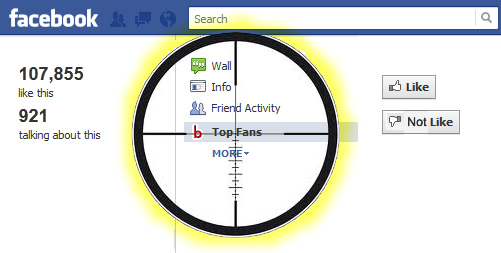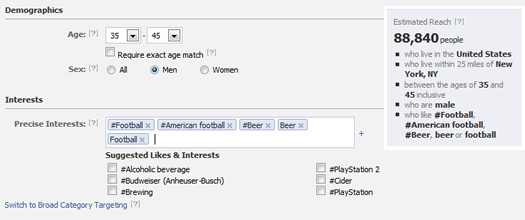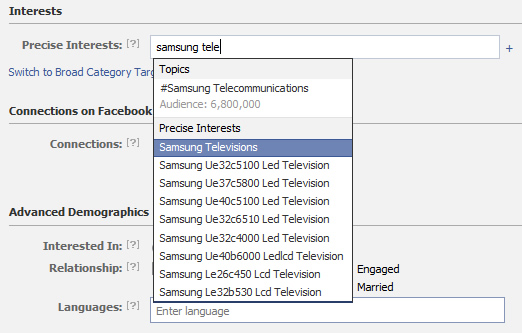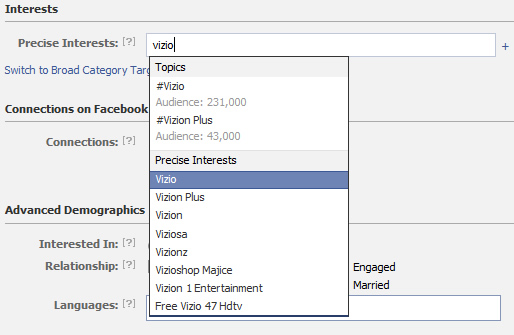
I’ve been launching more and more Facebook advertising for clients over the past few years. Although many marketers will be quick to say that Facebook Ads don’t produce the ROI that Search Marketing campaigns do, I don’t necessarily think that’s a fair comparison. Actually, I believe they can work together, and both can be powerful in their own ways. For example, Facebook provides powerful demographic and interest-based targeting that’s not available in SEM (for now anyway). Sure, you can target interests via The Google Display Network, but not to the level that Facebook provides.
Similar to SEM, upfront planning pays huge dividends. There’s a direct correlation between the amount of thought and research you put into your campaigns and the performance of those campaigns. For Facebook Ads, this comes down to your targeting, and the subsequent structure of your campaigns. While brainstorming various targeting options for clients, it’s amazing to see the audiences you can pinpoint via the “interests” available in Facebook.
For example, you have a wide range of demographic targeting options available to you, including age, location, gender, education, etc. In addition, you can target interests, which opens up a powerful mechanism for reaching an extremely targeted audience. For example, you can target men, aged 35-45, who live in New York City, who are college graduates, that are interested in football and beer. That’s pretty darn powerful.
An example of demographic and interest-based targeting in Facebook:

Targeting Facebook Fans
Considering the targeting options available to marketers in Facebook, it shouldn’t be surprising that questions quickly arise regarding competitors. For example, can a company target fans of a competitor’s Facebook page? And, can those competitors target your own fans? Does Facebook police this, or do they secretly want this to happen? These are all good questions, and it’s healthy for marketers to explore these topics in great detail.
To be clear, there’s no right or wrong answer with this subject. Some companies will go down one aggressive path, while other companies will avoid the strategy altogether. Let’s take a closer look at the situation below.
Precise Interest Targeting
When targeting interests in Facebook, you can use Broad Category Targeting or Precise Interest Targeting. When targeting precise interests, you can get extremely granular while building your audience. When you start searching for interests, Facebook populates the search box with various interests that match your keywords. For example, when I enter Samsung Tele…, you will see “Samsung Televisions” in the dropdown. The “Estimated Reach” box shows 130K people (in the United States).
Targeting people that have shown a precise interest in Samsung Televisions:

When you start entering keywords, interests that Facebook reveals that contain hash symbols (#) relate to anyone who has shown interest closely related to your keyword. Interests that show up without the hash tag are people that have expressed that specific interest (more targeted). Using the example above, you are targeting people that have liked Samsung Televisions since the hash tag is not present. Hypothetically, if you were a competitor of Samsung TV’s, you might choose to run aggressive advertising to their fan base in an attempt to get them to buy your own brand of HDTV. That’s how the battle begins…
For example, Samsung could turn around and target one of its competitors like Vizio:

The Ethical Problem
As you can imagine, this type of targeting brings up serious ethical questions. Although those fans might be an incredible target for a company, marketers needs to decide if that’s the type of advertising activity they want to be involved in. It’s similar to targeting competitor brand terms in SEM (yet even deeper). Note, I’m referring to running brand keywords only and not using competitor brand terms in your ads. There’s a difference.
As I explained earlier, there’s no right or wrong answer here. It completely depends on your company, your industry, and how your competition is playing the game. Are they targeting your fans? Are you losing customers to them? How does this come across to prospective customers? Will they know you are targeting them based on their “likes”? All of this needs to be weighed when deciding whether to run Facebook ads targeting competitor fans.
Facebook’s Stance
As of now, you can target competitor fans. Facebook lets companies do this without violating its advertising guidelines. Not only that, but Facebook can benefit greatly from competitor battles. As one competitor runs ads targeting another’s Facebook fans, the other company might retaliate. When they do, more ads are run, more money is spent, and Facebook generates more revenue. And the uglier the battle gets, the more money Facebook stands to make.
Therefore, I’m not sure this will change anytime soon. That’s unless Facebook is forced to change their policy (which could definitely happen). At that point, what gets changed, and what Facebook allows moving forward, is anyone’s best guess. This is just another reason to seriously analyze the situation before pulling the trigger on targeting a competitor’s fans. You might be within Facebook’s guidelines one day, and violating its terms the next. Welcome to digital marketing. :)
So, should you target competitor fans or not? As I explained earlier, it’s a tough question that needs to be analyzed on several levels. Therefore, to help you make an informed decision, I’ve provided several important points to consider below.
Points to Consider When Deciding Whether or Not To Target Competitor Fans with Facebook Advertising:
1. Weigh Risks and Benefits, Prepare for Possible Backlash
Don’t take this decision lightly. Depending on how aggressive you are, targeting competitor fans could cause serious backlash. Don’t simply implement a campaign that targets fans of competitor pages without walking through all the possible scenarios. For example, how will your competitors react, how will the audience react, how will your own fans react (if the story is surfaced) and what will your stance be if approached about the campaign?
Depending on the size of your company, I would make sure that you get several key people involved from Marketing, PR, Legal, etc. If you are a smaller company, then make sure others from your team are involved (both internal employees and important contractors like consultants or strategists from your agency). Walk through possible scenarios, the upside of targeting competitor fans, the downside, how you will respond, what happens if fans react negatively, what if your competitor goes public with their allegations, etc. Remember, there’s a difference between targeting an interest and targeting fans.
2. Don’t cross the line.
When setting up your ads, you need to decide how aggressive your creative will be. If you go too far, it can really anger your competitor(s), while also rubbing your audience the wrong way. For example, if you were targeting fans of a competitor, specifically targeting its weaknesses in your ads could be risky. You can also violate Facebook’s Advertising Guidelines by using competitor logos or misrepresenting a competitor.
Crossing the line could be perceived as sneaky and unprofessional. In addition to infuriating your competitors, their fans might not be thrilled either. Therefore, be careful with your ad creative.
3. Track and Analyze
This should go without saying, although I still see many companies not tracking their Facebook campaigns. If you decide to target fans of competitors, the performance of those campaigns will be the true test. If you map out a strong analytics strategy, you will know exactly how your campaigns are performing. Targeting competitor fans can be risky, so it’s important to know how well those campaigns are working. For example, tracking several conversion goals and events based on your specific business and website.
If you are driving visitors to an external URL (a landing page you control), then you should be looking at engagement levels, conversion, revenue, etc. For example, you might be utilizing a Facebook campaign to drive email signups, whitepaper downloads, ecommerce transactions, etc. Make sure you are tracking those goals on your site so you can analyze your Facebook campaigns based on performance. If not, you’ll see traffic and that’s pretty much it.
To Target or Not To Target… Facebook Fans
Facebook offers some incredible targeting options for marketers. Using a mixture of demographic targeting and interest-based targeting enables you to build powerful audience segments. Although that’s incredibly powerful, you can cross the line. Targeting competitor fans is a polarizing topic with no right or wrong answer. As I explained above, there are several key points to consider before pulling the trigger. And after analyzing the situation, you just might find that you never pull the trigger.
GG

Can you target fans of a certain page? I cannot seem to aim my ads at fans of a competitors page. When I type in their business name, it says not found. When I know they have a lot of fans.
Gary, thanks for your comment. You can target fans of a facebook page, but not all pages will show up when using precise targeting. There definitely seems to be a threshold for showing up in precise targeting. Do you know how many fans that page has?